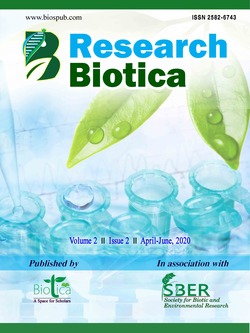
Furfural Synthesis from Maize Cob Using Co-Solvents
Sriramajayam, S.*
Dept. of Renewable Energy Engineering, Agricultural Engineering College and Research Institute, TNAU, Coimbatore, Tamil Nadu (641 003), India
J. Gitanjali
Dept. of Renewable Energy Engineering, Agricultural Engineering College and Research Institute, TNAU, Coimbatore, Tamil Nadu (641 003), India
K. Chandrakumar
Dept. of Renewable Energy Engineering, Agricultural Engineering College and Research Institute, TNAU, Coimbatore, Tamil Nadu (641 003), India
Keywords: Bioethanol, Biobutanol, Furfural, Maize cob, THF, Zea mays L.
Abstract
Biofuels and chemicals can be produced from the lignocellulosic biomass would be promising platform in the upcoming decades. The maize cob is selected as lignocellulosic biomass to synthesis chemicals. The maize cob treated with meagre concentration of dilute sulfuric acid (H2SO4) dehydrated with Tetrahydrofuran (THF) co-solvent and water in the ratio of 1:1 results with furfural formation. The maize cob sample acid catalysed dehydration process at 1, 2.5, 5 and 10% dilute H2SO4 is substantial for sugar compounds production, these compounds can be further fermented to produce liquid fuels viz., bioethanol, biobutanol in an efficient manner. The maize cob treated with 0.25, 0.5 and 0.75% of dilute H2SO4 dehydrated with THF co-solvent and water (1:1) results with furfural formation and highest concentration was found in 0.5% acid catalyzed. The furfurals obtained can be downstream processed to recover and can be used as fuel precursor.
Downloads
not found
Reference
Anthony, I.A., Boniswa P.G., Omobola O.O., Sampson N.M., 2017. Studies on characterization of corn cob for application in a gasification process for energy production. Journal of Chemistry 2017, 6478389. DOI: 10.1155/2017/6478389.
Cai, C.M., Zhang, T., Kumara, R., Charles, E., 2015. THF co-solvent enhances hydrocarbon fuel precursor yields from lignocellulosic biomass. Green Chemistry 15, 3140.
Huber, G., Iborra, W.S., Corma, A., 2016. Catalytic process for the conversion of biomass-to liquid alkanes. Chemical Reviews 106, 4044-4098.
Nikolla, E., Roman-Leshkov, Y., Moliner, M., Davis, M., 2011. THF a promising green solvent for furfural production. ACS Catalysis 1, 408-410.
USDA, 2019. Estimates Indian Corn Production for MY 2019/20, Capital market, Commodity insights.
Werpy, T., Peterson, G., 2004. Top Value-Added Chemicals from Biomass, Volume I: Results of Screening for Potential Candidates from Sugars and Synthesis Gas, EERE, PNNL, NREL, US DOE.
Yuriy, R.L., Christopher J.B., Zhen Y.L., James A.D., 2007. Production of dimethylfuran for liquid fuels from biomass-derived carbohydrates. Nature 447, 982-985.
Zeitsch, K.J., 2000. The chemistry and technology of furfural and its many by-products, Elsevier Science, Amsterdam, The Netherlands. p. 376.
